#la biblioteca de babel
Text
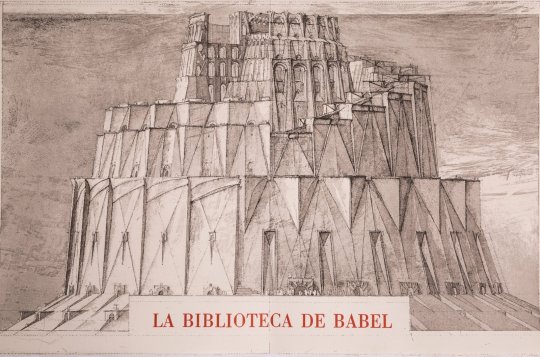
Jorge Luis Borges - La biblioteca de Babel
41 notes
·
View notes
Text
“Quizá me engañen la vejez y el temor, pero sospecho que la especie humana está por extinguirse y que la Biblioteca perdurará: iluminada, solitaria, infinita, perfectamente inmóvil, armada de volúmenes preciosos, inútil, incorruptible, secreta.”
La biblioteca de Babel - Ficciones - Jorge Luis Borges
#books#libros#clasics#clasicos#quotes#frases#library#biblioteca#jorge luis borges#literature#literatura#literary quotes#frases literarias#ficciones#la biblioteca de babel
8 notes
·
View notes
Text
Untitled Wednesday Library Series, Part 146
Long overdue: Tar for Mortar: The Library of Babel and the Dream of Totality (which book you can read for free here) published in 2018 by Punctum Books as written by Johnathan Basile (whose website you can read for free here).
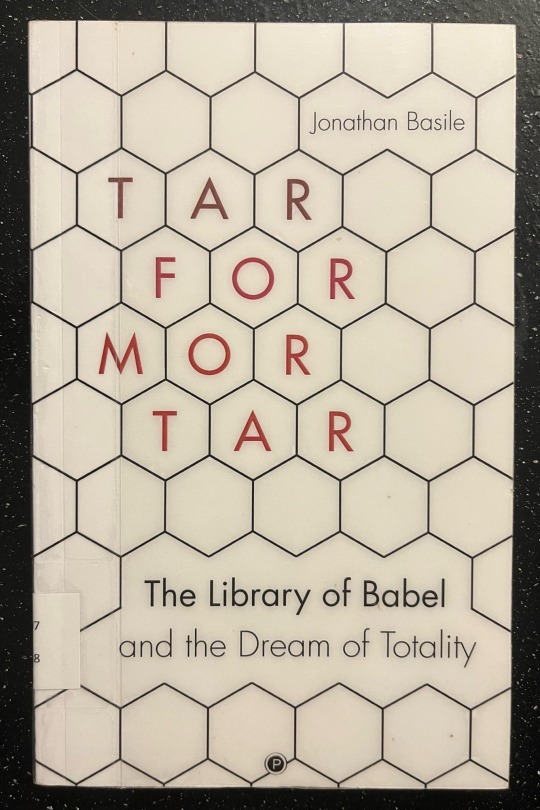


The How
Until a few minutes ago, I had it in my head that this has been on my shelf for, like, eight or nine years. Apparently it's only been six. Hmm. At any rate, I don't remember how I found it. I do recall this print copy being much cheaper than the publisher's current $19 tag.
I might've found a link myself on Basile's (to me) classic project libraryofbabel.info, but that dates back to 2015 and I couldn't say whether I was checking it when the book released. Maybe word of mouth? Doesn't really matter.
The Text
An exploration of Borges' classic (to lots of people) 'La Biblioteca de Babel' (an English translation of which you can read for free, e.g., here), more or less. Of course Basile is not the only person to have done such a thing, but he is the only person to have built a working proof of concept. This book is motivated by, though only partially about, that task.

This reads and thinks more or less like you'd expect from someone with the requisite interests and a background in comparative literature, by which I don't intend to mean anything especially good or bad. Thoughtful, broadly founded, and possessed of a good eye for irony. Of the recent Borges discussion I've read, this sets out to have — and actually has — the clearest head.
Lots of fun and extensive footnotes including the likes of links to the author’s stashes of unpublished/out of print translations by Borges’ frequent collaborator Norman Thomas di Giovanni. The PDF version is, for this and other reasons, maybe the better option.
The Object
Very handy, and it ought to be so. Although it's only 98 pages at 12.5 by 20 cm, it has some presence. Maybe not striking, exactly, but it fills space and the hand alright. A $19 paperback had better.
Small type, smallish (sorry, web-optimized) illustrations, and some interesting choices with header spacing, but overall pleasant and readable. I did some shockingly sloppy work on it with some self-adhesive reinforcement, but it's held up well in spite and because of that.


The Why, Though?
I really like a project retrospective; I really like hearing what people think their projects mean; I really like it when even those things don't seem like enough to get it out of someone's system. I only somewhat care about the conclusions this comes to about Borges and the (in)finite. I mostly just think it's neat.
20 notes
·
View notes
Photo
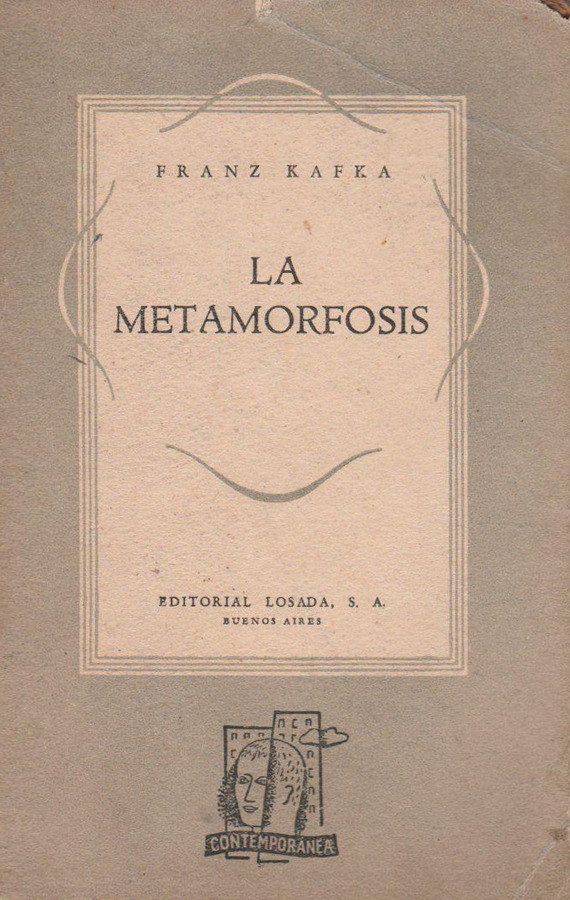

Franz Kafka, (1915), La Metamorfosis, Translated, and with a Foreword, by Jorge Luis Borges, Editorial Losada, Buenos Aires, 1943, Second Edition [Biblioteca de Babel, São Paulo]
#graphic design#typography#book#cover#book cover#franz kafka#jorge luis borges#editorial losada#1910s#1940s
108 notes
·
View notes
Note
¡me encanta tu spotify! estoy aprendiendo el español, ¿tienes algunos poemas o cuentos cortos que te encantan? que tengas un buen día bst xx
¡hola! <33 muchas gracias, (sorry i'm barely responding now, it's just that i don't check my inbox that often)
¡me da gusto escuchar que estás aprendiendo español y estás interesadx por las lecturas! <33 claro que puedo recomendar algunos poemas y cuentos cortos
gacela del amor desesperado - federico garcía lorca
exilio - alejandra pizarnik
naufragio inconcluso - alejandra pizarnik
las huellas - silvina ocampo
cielo de claraboyas - silvina ocampo
la debutante - leonora carrington
árboles petrificados - amparo dávila
lluvia - roberto bolaño
la biblioteca de babel - jorge luis borges
esfinges suelen ser - olga orozco
some of these poets/writers were contemporaneous during the surrealist writing movement in latam, i think there's a lot of interesting writing vanguards in latin america to explore, but these are some of my favorites, espero los disfrutes mucho <33 btw! what's your spotify username i'd love to follow!
20 notes
·
View notes
Text

Esta librería de Londres se ha autodeclarado "zona de desintoxicación digital". En su interior no hay internet y está prohibido el uso de teléfonos móviles y tablets. Emplea el nombre "librería", en español.
Se llama "Librería", un concept store situado al este de Londres que homenajea la librería infinita que Jorge Luis Borges describe en su famoso cuento La Biblioteca de Babel. La sensación de infinitud se consigue transmitir mediante formas irregulares y espejos en el techo.
Fuente e Imagen: "Letras Nómadas"
8 notes
·
View notes
Text
"El Olvido"
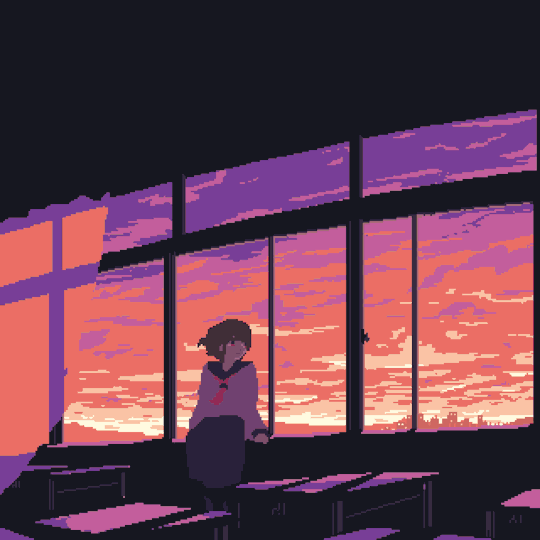
El olvido, ese enigmático compañero del ser humano, nos invita a reflexionar sobre su verdadero significado y su impacto en nuestra inteligencia y creatividad. ¿Es el olvido una debilidad o una fortaleza? ¿Una bendición o una maldición? Estas interrogantes, enraizadas en la frase "El olvido es la característica esencial de la inteligencia" de Jorge Luis Borges, nos guían hacia un viaje de introspección y descubrimiento.
Borges, maestro de la palabra y explorador incansable de los laberintos del pensamiento, nos legó una obra impregnada de la esencia del olvido. A través de relatos como "Funes el memorioso", "El inmortal" y "La biblioteca de Babel", nos sumergió en mundos donde la memoria se torna abrumadora, donde el olvido se convierte en un anhelo y una necesidad.
Desde la pluma del genio argentino, el olvido emerge como un proceso esencial para la inteligencia humana. Es el filtro que separa la esencia de la banalidad, la luz de la oscuridad. Nos permite discernir, organizar y simplificar la maraña de información que nos rodea, liberándonos del peso de lo superfluo y permitiéndonos pensar con claridad y creatividad.
Pero el olvido va más allá de ser un mero proceso cognitivo; es también un instrumento de adaptación y evolución. Nos brinda la flexibilidad necesaria para abrazar el cambio, para dejar atrás viejas creencias y paradigmas que ya no nos sirven. Nos otorga la libertad de reinventarnos, de forjar un futuro sin las cadenas del pasado.
En esta danza entre la memoria y el olvido, encontramos la esencia misma de la inteligencia y la creatividad humanas. Es en el equilibrio entre recordar y olvidar donde hallamos la verdadera sabiduría, la chispa que enciende el fuego de la innovación y el progreso.
Así, en cada página de la obra de Borges y en cada rincón de nuestra propia existencia, el olvido nos susurra su mensaje: no temas dejar atrás lo que ya no te nutre, porque en el vacío del olvido yace la semilla de nuevas ideas y horizontes por explorar.
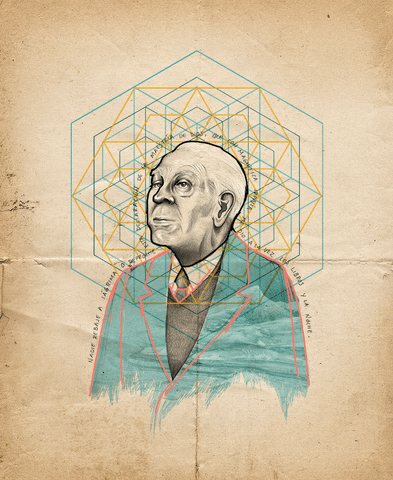
Poema : "El Olvido"
En el rincón más oscuro de la mente, donde se entrelazan sombras y recuerdos, yace el misterio del olvido, silente, un laberinto de senderos inciertos.
En el eco de antiguas memorias perdidas, se dibuja el paisaje del olvido, donde las huellas del tiempo son olvidadas, y el presente se funde con el albedrío.
El olvido, ese etéreo compañero, que borra nombres y rostros conocidos, que desdibuja caminos, cimientos enteros, y en el alma deja sus surcos hundidos.
En sus aguas turbias se pierden las lágrimas, de amores y sueños que se desvanecen, mientras las estrellas, en sus noches sin márgenes, guardan secretos que el olvido entremezcla.
Pero en su manto de niebla y de sombra, se esconden los tesoros del pensamiento, las semillas de futuros que la mente nombra, y las luces que guían nuestro aliento.
Entonces, en el umbral del olvido, nos encontramos con la magia del renacer, donde cada olvido es un nuevo sentido, y cada recuerdo, un pájaro por volver.
Así, en el laberinto del olvido y la memoria, tejiendo hilos de sueños y de destinos, descubrimos la esencia de nuestra historia, y en el olvido, hallamos nuevos caminos.
En el infinito susurro del tiempo, donde el olvido y el recuerdo se abrazan, encontramos el eco de un eterno aliento, que en el corazón del universo traza.
Autor :@magneticovitalblog

#OlvidoInteligencia#BorgesFilosofía#CreatividadHumana#ReflexiónFilosófica#MemoriaYOlvido#InteligenciaEmocional#PensamientoCreativo#EvoluciónPersonal#SabiduríaInterior#ExploraciónMental#autoconciencia#superacionpersonal#crecimientopersonal
4 notes
·
View notes
Text
adaptación hollywoodense berreta de La Biblioteca de Babel donde Borges es el villano que tiene el libro maestro para traducir la biblioteca y hay peleas draCHE RECIÉN TRATARON DE ASESINAR A CFK?????????????
73 notes
·
View notes
Text
under 40 pages into Piranesi and 1. i love it and 2. it is directly engaging with La Biblioteca de Babel and i love that too!!!!
20 notes
·
View notes
Note
I would like to hear you ramble about math 👉👈
La Biblioteca de Babel (The Library of Babel)
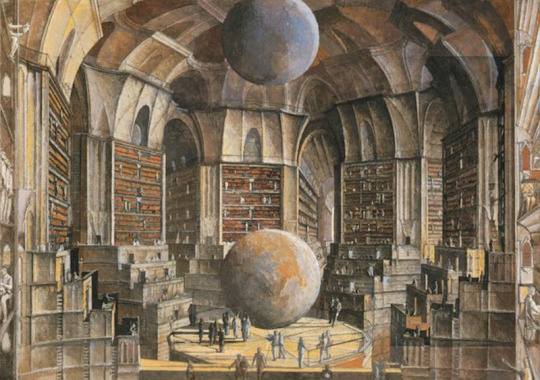
La Biblioteca de Babel was a short story by Jorge Luis Borges, published in 1941, and it's more or less a thought experiment about a world that takes the form of a vast library that consists of a shit ton of hexagonal rooms, each of which contains, well, the necessities for human life of course, but also lots and lots of books. Each book is 410 pages long, making use of only 25 possible characters (22 letters, plus the period, the comma, and the space), and no two books are the same, and altogether the library contains every single possible sequence of those 25 characters that can fill a 410-page book. Each book has 410 pages, each page has 40 lines, and each line has 80 characters, so the total number of characters within each book is 1,312,000 -- just over one million -- and each character can be one out of 25 possible characters.
So the approximate number of books in the Library of Babel would be 1.981x10¹⁸³⁴⁰⁷ or to put it another way, it's "1981" followed by 183404 zeroes. (continued below)
A vast, unthinkably vast majority of the books in this library would be utter gibberish, just meaningless sequences of letters and punctuation. Any book you pick up is just as likely -- as far as you know -- to have true information as it is to have untrue information. So... Net zero information.
This story has been alluded to in quite a few pieces of media, including Terry Pratchett's Discworld series and Christopher Nolan's Interstellar (2014).
Now what really fascinates me about this thought experiment is that the library includes every single possible sequence, which means that it would contain every book ever written and every book yet to be written. But more than that, it also includes every possible permutation of those books with small errors. Imagine rewriting Hamlet but you only change 1 letter. Now imagine doing that with a different letter every time and not stopping until you've done every possible version once. That's just the tip of the iceberg.
Accounting for differences between the Spanish and English alphabet, this post you're reading right now is somewhere in the Library of Alexandria BABEL, multiple times, in different books. There is a perfect 410-page memoir of your entire life in the Library of Alexanwwdria BABEL There is also a book describing you reading this book on the computer or on your smartphone. There are books that describe you reading them, books that describe what happens when you finish reading, and you have no way of knowing which one is true.
The wild thing is that the library is finite. It does end. There are no copies. But it is so vast that to us it may as well be infinite. And if you were to pick up a book, there is a non-zero chance that it will seem to be talking directly to you. And I have to wonder how I would respond to that. How many people would think a god was talking to them through the texts? What kinds of social structures would we create in there?
23 notes
·
View notes
Note
valen las historias? porque me gusta la biblioteca de babel.
sip! aunque si mandas esa historia la voy a contar como un voto para “Ficciones” ya que esa antología contiene esa historia
5 notes
·
View notes
Link
Una entrevista sobre mis hábitos de lectura en la revista en línea CUBAENCUENTRO.
4 notes
·
View notes
Text
Consigli di lettura per gli amanti di Casa di Foglie
🔶 Se ti è piaciuto Casa di Foglie di Danielewski allora poterbbero piacerti anche:
🔹 La biblioteca di Babele - Borges (racconto contenuto nel libro Finzioni)
🔹 La vita: Istruzioni per l'uso - Perec (labirinto)
🔹 Il processo - Kafka
🔹 Film notturno - Marisha Pessl (thriller)
🔹 Il Magus - Fowles
🔹 La paziente silenziosa - Michaelides (thriller, bellissimo)
🔹 Strangers - Yamada (storia di fantasmi, giapponese)
🔹 Utsubora (vol. 1 e 2)- Nakamura (mystery thriller; graphic novel in due volumi)
🔹 La troga - Rugarli
🔹 Le venti giorante di Torino - De Maria (un bel horror, molto ansiolitico)
🔹 Rabbits - Terry Miles (molto particolare; non mi è piaciuto moltissimo, ma mi ha dato certi incubi D:)
🔹 Trilogia della città di K. - Agota Kristof
🔹 L'etá inquieta - Starobinec (super weird, bellissimo!)
🔹 One Bloody Thing After Another - Joey Comeau (horror, bellissimo!)
🔹 The Number 73304-23-4153-6-96-8 - Thomas Ott (graphic novel senza testo)
🔹 Il demone di Maxwell + The Raw Shark Texts (in italiano: I pensieri dello squalo) - Steven Hall
🔶 Questi invece mi sono stati consigliati, ma devo ancora leggerli:
🔹 The Way Through Doors - Jesse Ball
#casa di foglie#casa di foglie danielewski#mark z danielewski#house of leaves#hol danielewski#house of leaves danielewski#das haus danielewski#night film marisha pessl#marisha pessl#steven hall#jesse ball#thomas ott#joey comeau#horror books#horror literature#libri horror#horror bücher#agota kristov#starobinec#terry miles#terry miles rabbit#the silent patient#the silent patient michaelides#the magus fowles#kafka#borges#perec
2 notes
·
View notes
Text
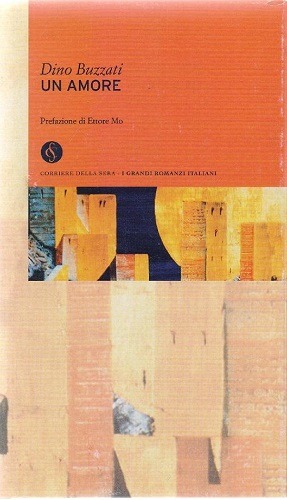

In Biblioteca puoi scoprire autori e opere che non conoscevi o di cui avevi sentito parlare ma che ancora non avevi avuto modo di leggere. Ed è per questo che abbiamo deciso di dedicare un angolo alla scoperta di questi "tesori nascosti".
Oggi l'opera prescelta è "Un amore" di Dino Buzzati.
Una Milano che è insieme ritratto della metropoli e simbolo della babele d’ogni tempo. Su questo sfondo si muove il protagonista di “Un amore”: un uomo inconsapevole di aver atteso troppo, che è rimasto nell’intimo un giovane e crede che il sentimento possa compiere miracoli. E così il professionista maturo si innamora perdutamente di una donna giovanissima, ma già carica della cinica spregiudicatezza e della stanchezza morale di un’epoca. Unico romanzo erotico di Buzzati, “Un amore” continua l’indagine nelle inquietudini dell’uomo contemporaneo descrivendo la parabola di un amore vero, di esemplare limpidezza, destinato a smarrirsi nella menzogna come in un labirinto.
Antonio Dorigo è un professionista affermato di quasi cinquant’anni, vive a Milano negli anni Sessanta del Novecento, è scapolo. Ha sempre considerato le donne come creature irraggiungibili e lontane; si è sempre considerato poco desiderabile, non attraente per le ragazze che veramente gli piacevano. Così per calmare il bisogno fisico dell’amore si concede di andare con le prostitute: spesso giovanissime, belle, disinibite e soprattutto sempre disponibili in cambio di denaro. Finché un giorno, proprio durante uno di questi incontri a pagamento, conosce una ragazzina dai lunghi capelli neri e dal nome certamente significativo a livello letterario: Laide. Essa trascina il suo uomo, noioso borghese, nel vortice di una relazione carnale che gli procura tanta infelicità quanta vita. Laido infatti è qualcosa di sporco, sporco nel senso di immorale, osceno: Laide trascina Dorigo in una specie di incubo fatto di bugie, gelosia e dolore: il problema è che il nostro ingenuo se ne innamora. Lui stesso si meraviglia e si sbigottisce di fronte a questo inatteso avvenimento. Ma si tratta di una relazione malata, di una passione che porta solo dolore e sofferenza, è il loro legame che è sbagliato, fondato su rapporti di potere e soldi, interessi che non hanno niente in comune con il sentimento dell’amore.
Buzzati ci accompagna nel racconto attraverso il flusso di coscienza del protagonista in cui salta la punteggiatura perché i pensieri corrono veloci in un turbinio di parole inarrestabili, una cascata di immagini che marcano la sua ossessione bruciante, il suo pensiero fisso, la sua dolce-amara sofferenza, il suo sperare “esasperato” che fa patteggiare ora per l’una ora per l’altra parte, in un gioco senza vincitori né vinti, dove l’amore non è che una maledizione a cui non è possibile resistere.
La prosa è dolce ed elegante; l'erotismo è gestito con grande stile, mai esplicito ma costantemente aleggiante su ogni pagina dell’opera. L’analisi psicologica è magistrale, Buzzati ci porta nella mente del protagonista sviscerandone ogni più riposto pensiero, ogni insano meccanismo mentale, ogni angosciante paura. L’epilogo è sorprendente, l’amore, che sia reale o immaginario, sano o malato, appagante o tormentato, è sempre il grande, vero, inevitabile leitmotiv della vita di tutti noi.
Dino Buzzati Traverso (1906 – 1972) è stato uno scrittore, giornalista, pittore, drammaturgo, librettista, scenografo, costumista e poeta italiano. Fin da studente collaborò al Corriere della Sera come cronista, redattore e inviato speciale. Autore di un grande numero di romanzi e racconti surreali e fantastici, tanto da esser stato a più riprese definito il “Kafka italiano”, viene considerato, insieme a Italo Calvino, Tommaso Landolfi e Juan Rodolfo Wilcock, uno dei più grandi scrittori fantastici del Novecento italiano: il suo libro più noto è “Il deserto dei Tartari”, romanzo del 1940. Lo scrittore sudafricano J. M. Coetzee, premio Nobel nel 2003, si è ispirato alla trama de “Il deserto dei Tartari” per scrivere uno dei suoi capolavori, “Aspettando i barbari”, pubblicato nel 1980. Ancora oggi, grazie a un numero elevatissimo di traduzioni - in primis la Francia, dove, quasi avendolo eletto a loro autore, ne hanno pubblicato l'Opera omnia - Buzzati gode di un vasto riconoscimento in tutto il mondo.
#tesoronascosto#tesorinascosti#consigliodilettura#libroconsigliato#dinobuzzati#unamore#romanzoerotico#narrativaitaliana#corrieredellasera#biblioteca#consigliobibliotecario#consigliolibresco#bibliotecacomunale#bibliosanvale#cosaleggere#ilpiaceredileggere#lettura#leggereèunpiacere#consiglibibliotecari#libri#settembreinlettura#limportanteèleggere#inquietudineumana#monologointeriore#raccontolungo#flussodicoscienza#bibliotecasanvalentino#bibliosanvalentino
2 notes
·
View notes
Text

Charles Howard Hinton - Teseracto
"Por ejemplo, el desplazamiento del cubo rosa-oscuro hacia arriba y hacia la izquierda desencadenaba una compleja serie de movimientos de todo el conjunto. A fuerza de semejantes ejercicios mentales, el devoto lograría intuir paulatinamente la cuarta dimensión." Jorge Luis Borges, Prólogos de la Biblioteca de Babel.
2 notes
·
View notes
Text
La (nueva) biblioteca de Babel
Valenzuela Navarrete, G. (2013). La (nueva) biblioteca de Babel. Entretextos, 5(15), 1–7. https://doi.org/10.59057/iberoleon.20075316.201315475
Ha llegado el momento en el que nos resulta difícil concebir la vida sin computadoras e Internet; sin embargo, a menudo se desconoce el origen de un invento que se ha hecho tan omnipresente en nuestros días. En este artículo, se hace primero un repaso de…

View On WordPress
0 notes